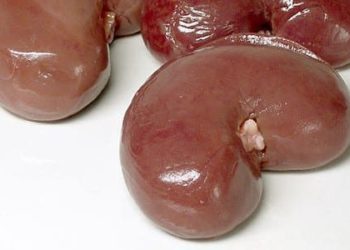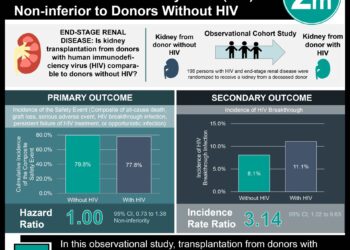The 3C Study: Alemtuzumab may reduce acute rejection following kidney transplant
1. Alemtuzumab induction treatment significantly reduced events of biopsy-proven acute rejection (BPAR) when compared with standard basiliximab-based therapy (BBT).
2. Kidney graft function at six months was not significantly different between the two therapy regimes.
Evidence Rating Level: 1 (Excellent)
Study Rundown: Acute antibody-mediated or cellular rejection affects approximately 16% of kidney transplant patients following standard BBT (basiliximab followed by standard-dose tacrolimus, mycophenolate, and prednisolone). Observations suggest such acute rejection events may predict higher risk of ultimate graft failure. Previous studies have separately suggested substitution of alemtuzumab for basiliximab, and lower doses of calcineurin inhibitors (e.g. tacrolimus) may reduce acute rejection events.
This randomized study of 852 kidney transplant patients compared acute rejection rates between standard BBT and alemtuzumab-based treatment (ABT: alemtuzumab followed by low-dose tacrolimus and mycophenolate without steroids). Six months post transplantation, ABT resulted in a nearly 60% reduction in BPAR events: 7% of patients treated with ABT and 16% of patients treated with BBT had experienced BPAR. While the number of ABT patients suffering from cellular BPAR was less than half that of B20 patients, no significant between-group difference was found for antibody-mediated BPAR events. Despite reduced BPAR risk, graft function was not significantly improved in ABT patients.
This study varied induction treatment type, tacrolimus dosage and steroid presence across the two therapy regimes, making it difficult to identify whether individual or synergistic effects are behind early ABT success. Long-term results from this continuing study will help evaluate the relationship between acute rejection and lasting transplant survival.
Click to read the study in The Lancet
Click to read an accompanying editorial in The Lancet
Relevant Reading: Reduced Exposure to Calcineurin Inhibitors in Renal Transplantation
In-Depth [randomized controlled trial]: This randomized, open-label, multicenter study of 852 kidney transplant patient compared BBT and ABT in their ability to reduce acute rejection events. Patients over the age of 18 and within 24 hours of transplantation surgery were recruited to the study. One half of the patient group was allocated to ABT, the other half to BBT. The minimization method was used to balance patient and donation characteristics across the two cohorts. Specific dosage amounts and times for each post-transplantation treatment regime are detailed in the original article. Event rate ratios were determined by Cox proportional hazards model and two-sided p-value significance was evaluated by log-rank test. The findings of this study consider results from the initial six-month post-transplantation period.
ABT patients had a significantly reduced risk of BPAR within six months of kidney transplant when compared to BBT patients (Hazard ratio (HR) = 0.42, p < 0.0001). BPAR occurred in 68 BBT patients and 31 ABT patients. The ABT reduction in total BPAR is attributed to cellular BPAR events (HR = 0.37, p < 0.0001), and not antibody-mediated BPAR events (HR = 1.59, p = 0.41). ABT patients had increased occurrence of leucopenia though no significant difference was found for serious infections or deaths. ABT was not found to improve graft function at six months.
More from this author: Chemokines in cardiac allografts promote graft rejection in mice, Modulating lymphocyte populations decreases graft rejection in mice,Adding Evolocumab to statin therapy further decreases LDL-C levels,Genetic variant linked to poor patient survival following lung transplantation, Neuroendocrine tumor marker pancreastatin may be predictive of survival
Image: PD
©2012-2014 2minutemedicine.com. All rights reserved. No works may be reproduced without expressed written consent from 2minutemedicine.com. Disclaimer: We present factual information directly from peer reviewed medical journals. No post should be construed as medical advice and is not intended as such by the authors, editors, staff or by 2minutemedicine.com. PLEASE SEE A HEALTHCARE PROVIDER IN YOUR AREA IF YOU SEEK MEDICAL ADVICE OF ANY SORT.







